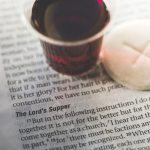This excerpt is from Themelios 44.1. The new April 2019 issue has 210 pages of editorials, articles, and book reviews. It is freely available in three formats: (1) PDF, (2) web version, and (3) Logos Bible Software.
In fall 1517, a German monk offered theses for disputation which would shake the faith and practice of the world around him. They cut against the grain of ecclesiastical and theological practice and would set a course for ongoing reform and challenge according to God’s Word. We do well to consider afresh those principal concerns at the root of the Protestant Reformation. So we turn again to Wittenberg, to Luther, and to the 97 theses. That’s right. On September 4, 1517, Luther participated in a disputation regarding sin and the will, nature and the experience of Christian salvation. This academic disputation, (much) later dubbed the “Disputation against scholastic theology,” has not gained the level of acclaim garnered by the later “95 Theses or Disputation on the Power and Efficacy of Indulgences,” but they will capture our attention and prompt some thinking regarding what shape theological practice might take this side of Luther’s witness.
These theses actually cut right to the heart of so many of Luther’s abiding concerns. Far more than the focus on indulgences to come two months later, these theses turn directly to issues of human nature and divine salvation. They forecast in many ways that great text which would so mark Luther’s legacy, his 1525 response to Erasmus entitled The Bondage of the Will. They thread the needle of assaulting the latent tradition which he finds so marred by hubristic excess without shirking his abiding commitment to learn from Augustine, who had himself been a formative thread of that late medieval fabric. In many ways, these theses, like the Heidelberg Disputation of the following year, will do the hard work of beginning to connect the emerging Reformational vision of sin and grace with matters of intellectual authority and theological formation. Here we see the force and the tension of Luther’s theology.
In this essay I want to argue with Luther seemingly against Luther. That is, by tracing Luther’s anthropology and soteriology through, I will seek to show that today a scholastic theology with certain disciplined protocols in place prompts us to lean against our sinful proclivities and to linger longer before the life-giving Word of God. In so doing, however, I will seek to sketch an approach to scholastic theology which ties its task to the pursuit of theological discipleship and even intellectual asceticism. To do so means that the description offered here differs from some lingering assumptions about scholasticism and about the practice of systematic theology today and challenges the disciplinary status quo in some fundamental ways. As much as the argument seeks to argue for the ongoing need for the theological calling, then, it also aims to reorient the way in which that practice follows in much of its modern exercise by reorienting systematic theology as a form of intellectual asceticism. In so doing Luther is a genuine prompt, in as much as he not only reflected upon the stranglehold of sin (in the 97 theses) but also sought in multiple ways to orient theology around his account of sin and grace (in various texts). While arguing with Luther regarding our sinful proclivities and our dire need for God’s gracious intervention even in the life of the mind, then, we will also turn beyond and, to some extent, against Luther to espouse an argument for a distinctly scholastic practice of theology so as to further those spiritual ends. Four specific aspects regarding the shape of a sanctifying approach to scholastic theology will conclude the proposal.
Is there enough evidence for us to believe the Gospels?
 In an age of faith deconstruction and skepticism about the Bible’s authority, it’s common to hear claims that the Gospels are unreliable propaganda. And if the Gospels are shown to be historically unreliable, the whole foundation of Christianity begins to crumble.
In an age of faith deconstruction and skepticism about the Bible’s authority, it’s common to hear claims that the Gospels are unreliable propaganda. And if the Gospels are shown to be historically unreliable, the whole foundation of Christianity begins to crumble.


































